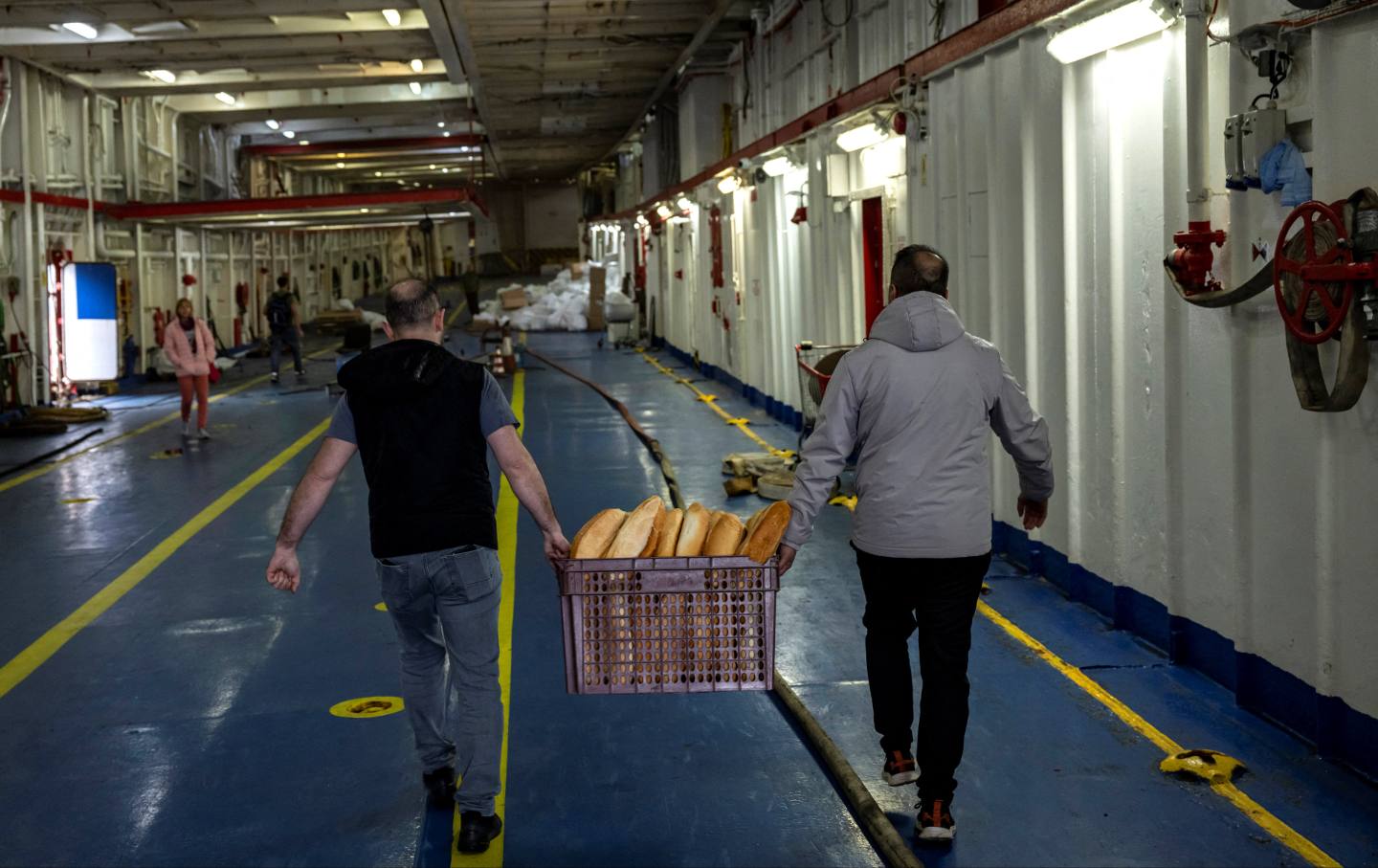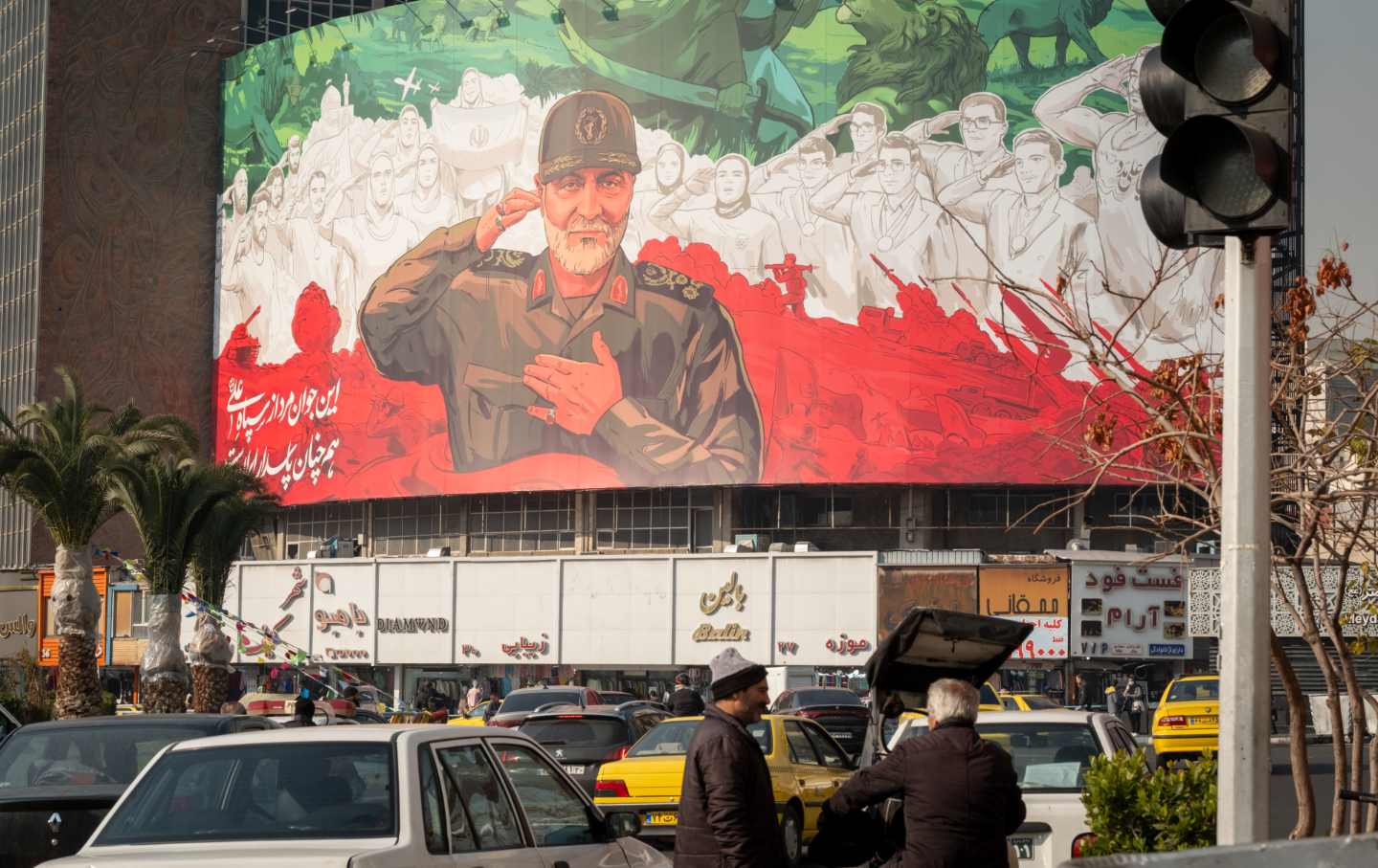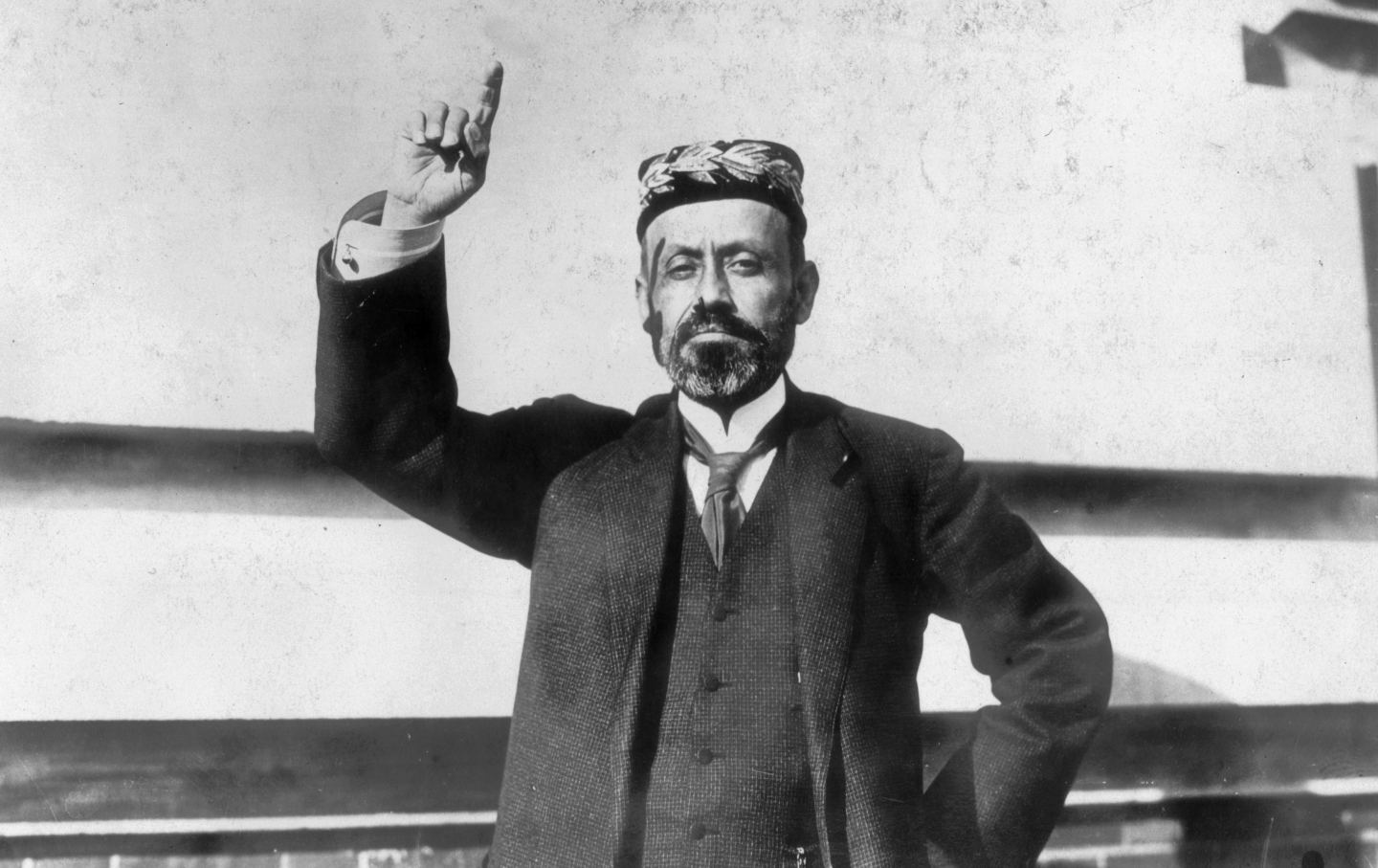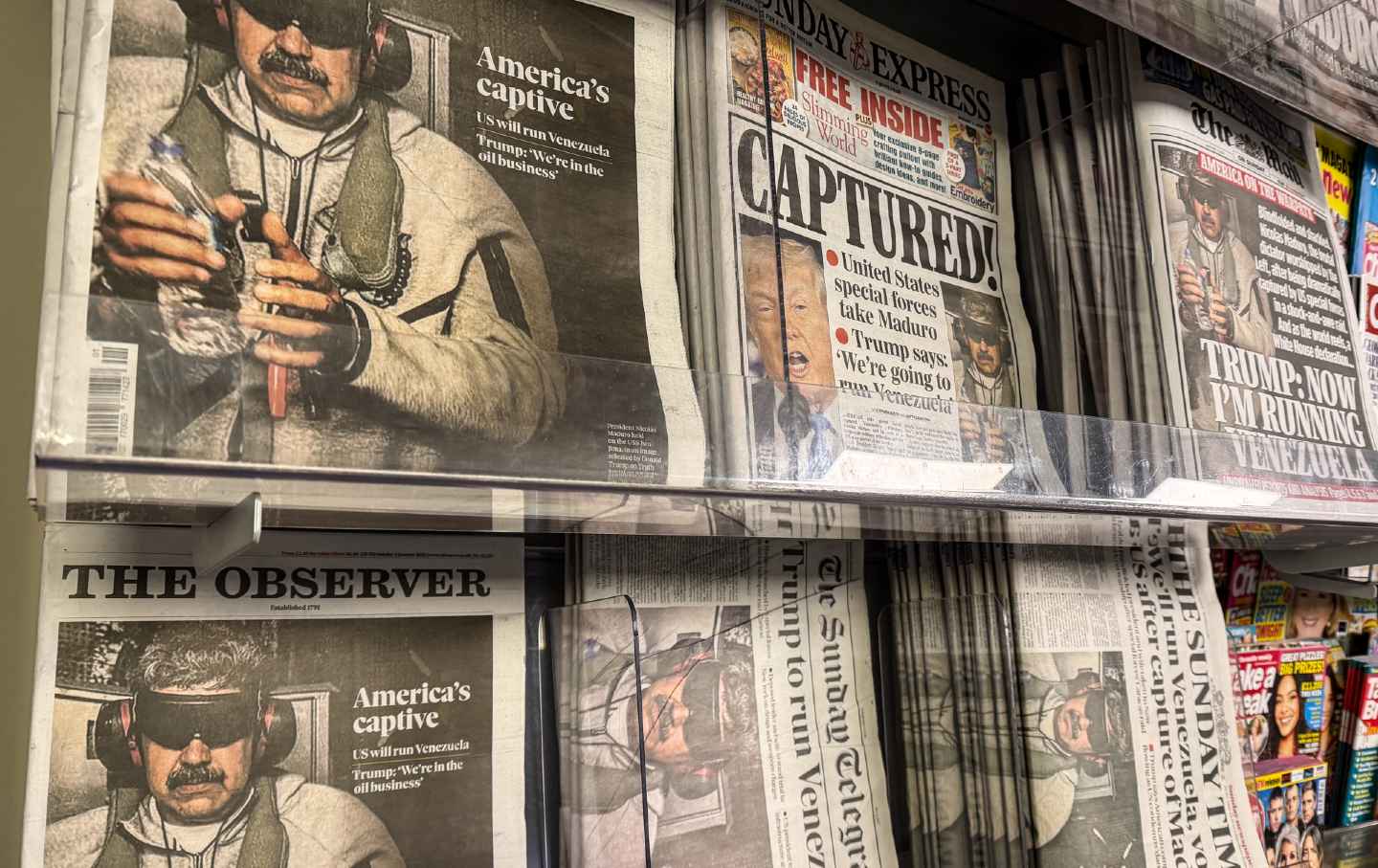The Freedom Flotilla Is Sailing Into Its Most Dangerous Waters Yet
The humanitarian convoy is trying to deliver vital aid to Gaza at a time when the stakes—and the risks—could not be higher.

Bread is carried on board as workers prepare a ship from the Freedom Flotilla Coalition while it anchors in the Tuzla seaport, in Istanbul on April 19, 2024.
(Yasin Akgul / AFP via Getty Images)The voyage of the Free Gaza Movement began in 2008 when two small fishing boats carrying 44 passengers sailed toward the Gaza Strip. The boats brought in about 10 international activists who would stay in Gaza for longer than the rest—people determined to bear witness to the effects of the brutal Israeli occupation—and brought out several Gazans who desperately needed to evacuate. Among those the group managed to get out were a 15-year-old amputee seeking medical care, a mother and children who had been separated from their family for years, and students who had the opportunity to study abroad but were prevented from pursuing their education.
Huwaida Arraf, the former chairperson of the Free Gaza Movement, a group created to alert people about the “prison-like” conditions in the Strip through such voyages, led five of these trips in 2008 without Israel’s permission to enter Gaza, which Israel had put under an almost total blockade. Arraf remembers “how overjoyed the people of Gaza were that we arrived,” she said, “because they saw people willing to challenge Israel’s siege.”
Eventually, the movement upgraded its boats to large fleets and partnered with other organizations to form the Freedom Flotilla Coalition. Now, that coalition—consisting of hundreds of people from over 30 countries, including the United States, Turkey, Malaysia, South Africa, and Ireland—is attempting to transport 5,500 tons of aid by sea from Istanbul to Gaza. This is far from the first time the coalition has tried to break Israel’s 17-year naval blockade of the Strip, but it is perhaps the most consequential voyage it has taken in its history.
The Freedom Flotilla passengers are determined to end the illegal siege of Gaza, despite the risks this mission poses to their lives. Gaza has been sealed off since 2007, but after October 7 Israel escalated the blockade and prevented the entrance of food and other aid into the Strip, killing even humanitarian workers who attempted to deliver it with Israeli permission. At least 31 Palestinians have died of starvation, on top of the over 34,000 Palestinians killed by Israeli shelling.
The volunteers say that, since their governments have largely stood by while Israel destroys Gaza, it’s their responsibility, and right, to take nonviolent, direct action.
Flotilla organizers told me that everyone on board went through an extensive vetting process to ensure that they are well-intentioned and mentally suited to embark on such a journey, and that they are required to be unarmed during the voyage. The group also gathered in Istanbul for training focused on nonviolent de-escalation prior to departure.
But it’s far from certain that Israel will also choose nonviolence. Israeli channel N12 reported that the military was preparing to potentially take over the flotilla, and the volunteers have recorded videos of themselves saying, “I have been taken captive. Please call the US State Department and call for assistance,” to be released in case of such a raid.
The specter of violence is not theoretical. Israel has reacted brutally to past Freedom Flotillas—most notably in 2010, when a violent Israeli assault on a convoy of six vessels containing around 700 passengers ended with the killing of 10 Turkish citizens on the ship Mavi Marmara.
The remaining people on the flotilla were imprisoned and their photographic evidence of the raid was confiscated. Arraf, who is Palestinian with Israeli citizenship and was aboard the Challenger, a vessel right next to the Mavi Marmara, was interrogated and violently thrown out in an unknown location. Others were “detained for 72 hours incommunicado while Israel got their version of the propaganda story out,” she said.
The exact events of the raid are still unclear. Ann Wright, a former US diplomat turned activist, was also aboard the Challenger. She said passengers grabbed whatever they could to defend themselves once the Israelis started to fire down from a helicopter, testimony that echoes a United Nations investigation’s conclusion that six passengers were shot in a manner consistent with “extra-legal, arbitrary, and summary execution” by the Shayetet 13, a unit of the Israeli navy.
The raid sparked international outrage, and Israel vowed to ease the blockade but little was done to follow up on that promise. Last November, Israeli bombs destroyed a memorial in Gaza for the Mavi Marmara victims.
One of the most lasting effects, however, was on Turkey-Israel relations, which, prior to the attack, were uniquely positive for the region. Immediately after the raid, then Prime Minister (now President) Recep Tayyip Erdoğan criticized the “bloody massacre” of Turkish civilians and expelled Israeli diplomats. Multiple efforts to rekindle diplomacy have been made, and relations were normalized again in 2022, but Erdoğan has remained a loud critic of Israel; just two weeks ago, Turkey announced that it would restrict exports of 54 products to Israel after it was barred from dropping humanitarian aid into Gaza.
Now, Erdoğan must decide what to do about the Freedom Flotilla. After facing pressure from Israel, both Cyprus and Greece have prevented the flotilla’s boats from using their ports. Turkey has yet to make such a decision—making it an ideal location for departure, geographically and politically. For now, members of the flotilla say their departure has only been delayed with extensive checks on passports and other documents.
Erdoğan remains committed to his Pan-Islamic, populist foreign policy and has expressed his desire to be a Middle East peace mediator. As Qatar slowly grows tired of hosting meetings with Israeli and Hamas officials, Turkey has signaled that it is prepared to step in. At the same time, Erdoğan is still recovering from local elections in which his party suffered many losses, which could impact his willingness to get further dragged into the Middle East. A source on the flotilla told me that it has reduced the number of Turkish citizens coming on the boats, so as not to pull the country into a regional conflict. But Turkey could very well become a key player if the boats leave from its ports, and especially if Israel attacks its citizens once again.
The stakes are unimaginably higher for the coalition than ever before. In addition to potentially altering Turkey’s role in the region, the flotilla is facing off against a far more extreme Israeli government. “Israel has become more unhinged with impunity that the US has guaranteed,” said Arraf.
“There couldn’t be a more difficult combination of circumstances for the eastern Mediterranean,” said Wright, who is leading the organization US Boats to Gaza on the trip. “Generally our boats are facing the Israeli government. But now we are facing a genocide in Gaza and the bombing of a diplomatic facility,” she continued, referencing the Israeli strike on an Iranian embassy complex in Syria, which Iran has retaliated against.
Popular
“swipe left below to view more authors”Swipe →Wright says that another objective of the flotilla is to get global leaders to respond with sanctions against Israel. She has doubts that the United States will effectively pursue justice in the case of a raid, but does expect help from other countries. “That’s why we have people from many other countries. The South African and Irish governments will do what they can to protect its citizens,” Wright said. Turkish groups IHH and the Mavi Marmara Association, the latter created by relatives of those killed on the Mavi Marmara in 2010, are key organizers in the coalition.
Dylan Saba, a half-Palestinian and half-Jewish American attorney and writer joining the flotilla, told me that Israel is becoming desperate as they fail to achieve their political goals. “Israel is using control of humanitarian aid to achieve what they have not been able to achieve with military force alone. They have not been able to liberate hostages,” he said. “They don’t have much left of Gaza to destroy, and they’re losing political capital as the world is waking up to the genocide.”
The flotilla will be advantageous, under every circumstance, he said. “No matter how they respond, it’s a bad look for them. If they respond with force, there would be a massive backlash in the West. If they arrest them, that will also be a diplomatic problem. If we are able to successfully enter Gaza, we will have successfully broken the blockade.”
But launching the boats is the first challenge the coalition must overcome. Between 2008 and 2010, the Free Gaza movement made many unsuccessful attempts; Israeli naval ships rammed and destroyed one of the boats, and commandeered and arrested passengers on another. Wright says there was also sabotage of a 2011 flotilla, with damage done to propellers and pipes. Eventually, the boats were prevented from departing Greece after facing pressure from Israel. Now, the flotilla says it has been delayed by “Israeli tactics.”
Along with hundreds of people from all walks of life—including social workers, artists, parliamentarians, an 80-year-old Argentinian doctor, and a former mayor of Barcelona—the ships are outfitted with dozens of journalists to keep record of the story. “We are going straight to Gaza, and Israel should not interfere. They know we are coming; they can’t claim any mistake,” Arraf said. A violent response from Israel, she added, would “be very much an intentional act.”
More from The Nation

Europe Signs Up for More Humiliation by Trump Europe Signs Up for More Humiliation by Trump
As the post–Cold War order cracks up, the fault lines don’t just run through the Atlantic, but Europe itself.

European Cowardice Is Empowering Trump’s New Imperialism European Cowardice Is Empowering Trump’s New Imperialism
NATO allies don’t want to confront Trump’s aggression. But they may ultimately not have a choice.

The Assassination That Paved the Way for Trump’s Venezuela Attack The Assassination That Paved the Way for Trump’s Venezuela Attack
How Trump’s illegal 2020 killing of Qassem Soleimani—and the West’s indifferent response—laid the groundwork for the brazen abduction of Nicolás Maduro.

Before There Was Nicolás Maduro, There Was Cipriano Castro Before There Was Nicolás Maduro, There Was Cipriano Castro
Behind today’s headlines is a history of imperial outrage—including a Philadelphia contract man who wreaked havoc in early-20th-century Venezuela and helped oust a president.

The US Is a Rogue State That Deserves to Be Sanctioned The US Is a Rogue State That Deserves to Be Sanctioned
Where is the international outrage over the US assault on Venezuela and kidnapping of Maduro?



